Want All the Data?
Purchase the BFCM Offers Database and you'll get:
- A massive spreadsheet of 700+ offers
- 3125 offer screenshots
- Q4 Holiday Planning Calendar Template
- Q4 Offer Calculator

It’s no secret.
Successful holiday campaigns live or die by a single ingredient: the offer.
Sure, creating a profitable Q4 marketing strategy matters. True, the right ad creative fuels those results. And yes, nailing down your tactics and timelines are musts.
But, in a holiday shopping season dominated by deal hunters, the offer is almighty.
Unfortunately, knowing that does nothing but intensify the questions that surround you:
Hark, we bring tidings of great joy. In preparation for 2023, we dug deep and …
Compiled the best Black Friday, Cyber Monday offers from 737 of ecommerce’s most successful brands.

In fact, we did more than just compile them.
We categorized each by deal structure. Crunched the numbers. And simplified everything into one data-packed infographic.
But wait, there’s more 😉 …
We also took 3,125 desktop, mobile, and social screenshots; labeled them by brand, event, and device; then dropped ‘em all into the ultimate swipe file.
Examining the full data set of of 700+ online stores and combining primary with secondary offers reveals the most-popular holiday season discounts:
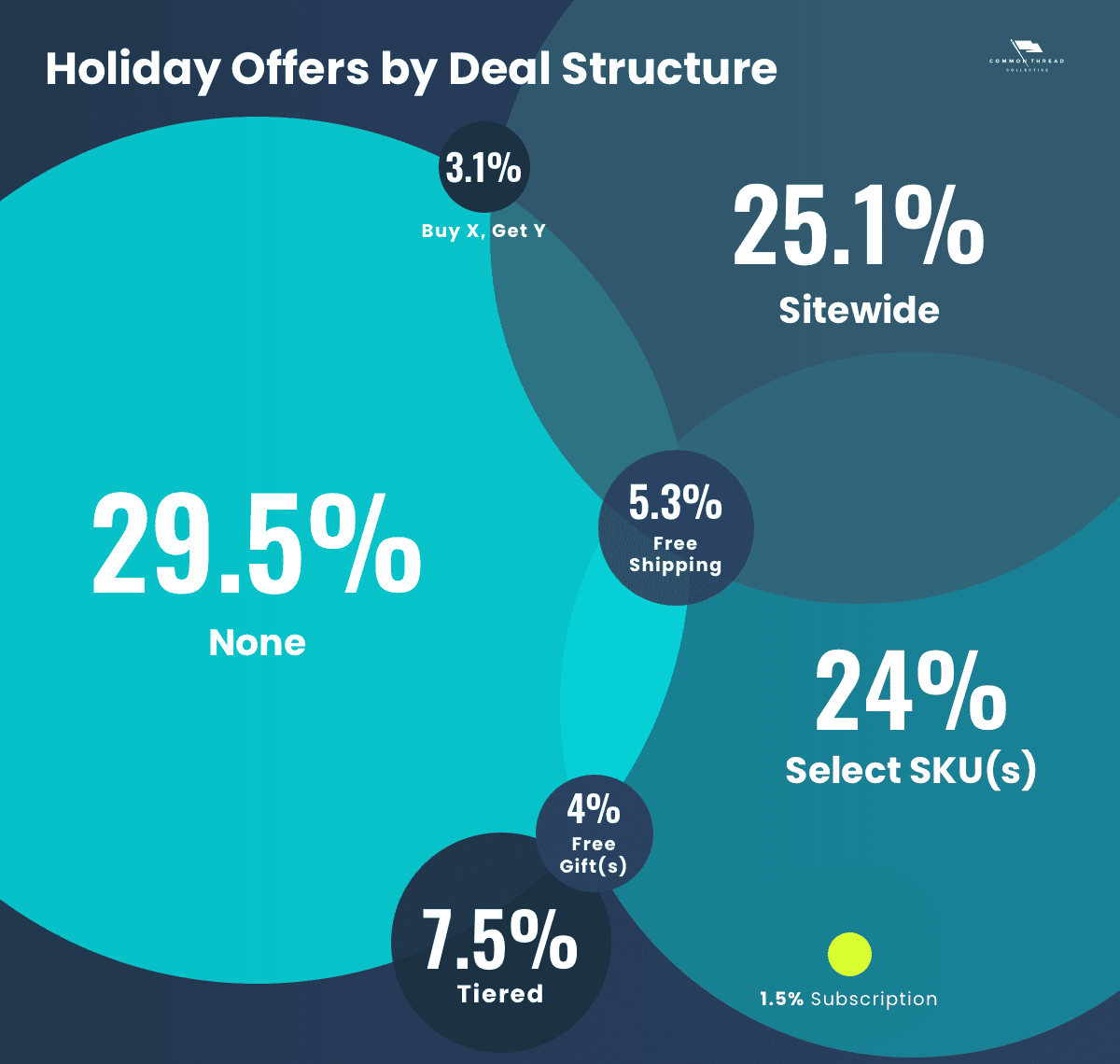
You probably noticed something fascinating about 2022’s offer data:
For the first time, the most popular Black Friday offer was … no offer at all.
This is in stark contrast to 2020 and 2021, where sitewide discounting was the most common offer type.
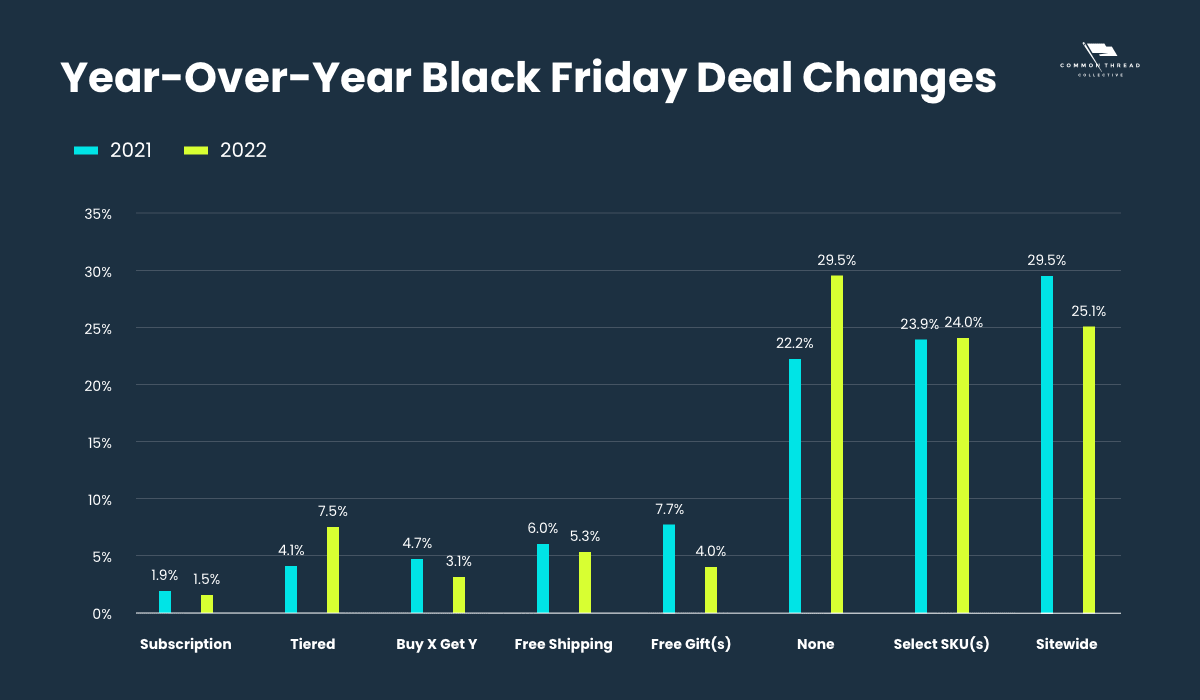
So why did a no-discount approach win out on a day famous for discounts?
For many online retailers with strong brand awareness, the excitement of the “holiday” sufficed to pique consumers' appetites. Without promoting a specific discount, the offer of high-quality products and service meant enough.
Which is why, although “no discount” was the 2022 winner, we still don’t suggest that you just forgo discounting altogether — unless you’re already an enormous brand with wide recognition.
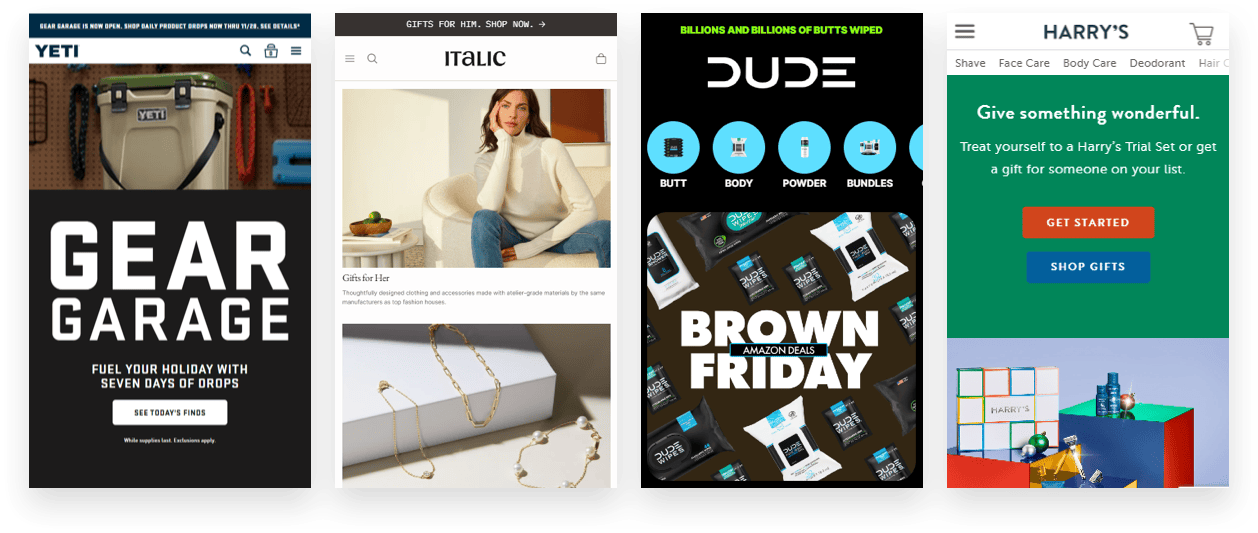
Among those that renounced discounting were brands like Athletic Greens, Italic, and Yeti as well as subscription-based retailers like Stitch Fix and Harry’s:
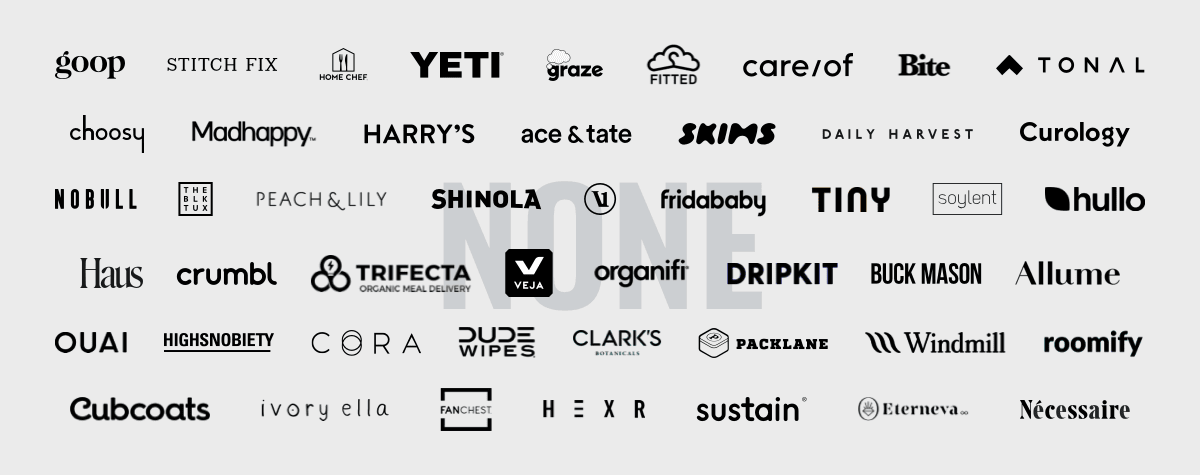
More instructive for smaller brands is the second-place finisher, the sitewide discount. Within that category …
For Cyber Monday, 50% markdowns were more common. Although, 20-25% still reigned supreme.
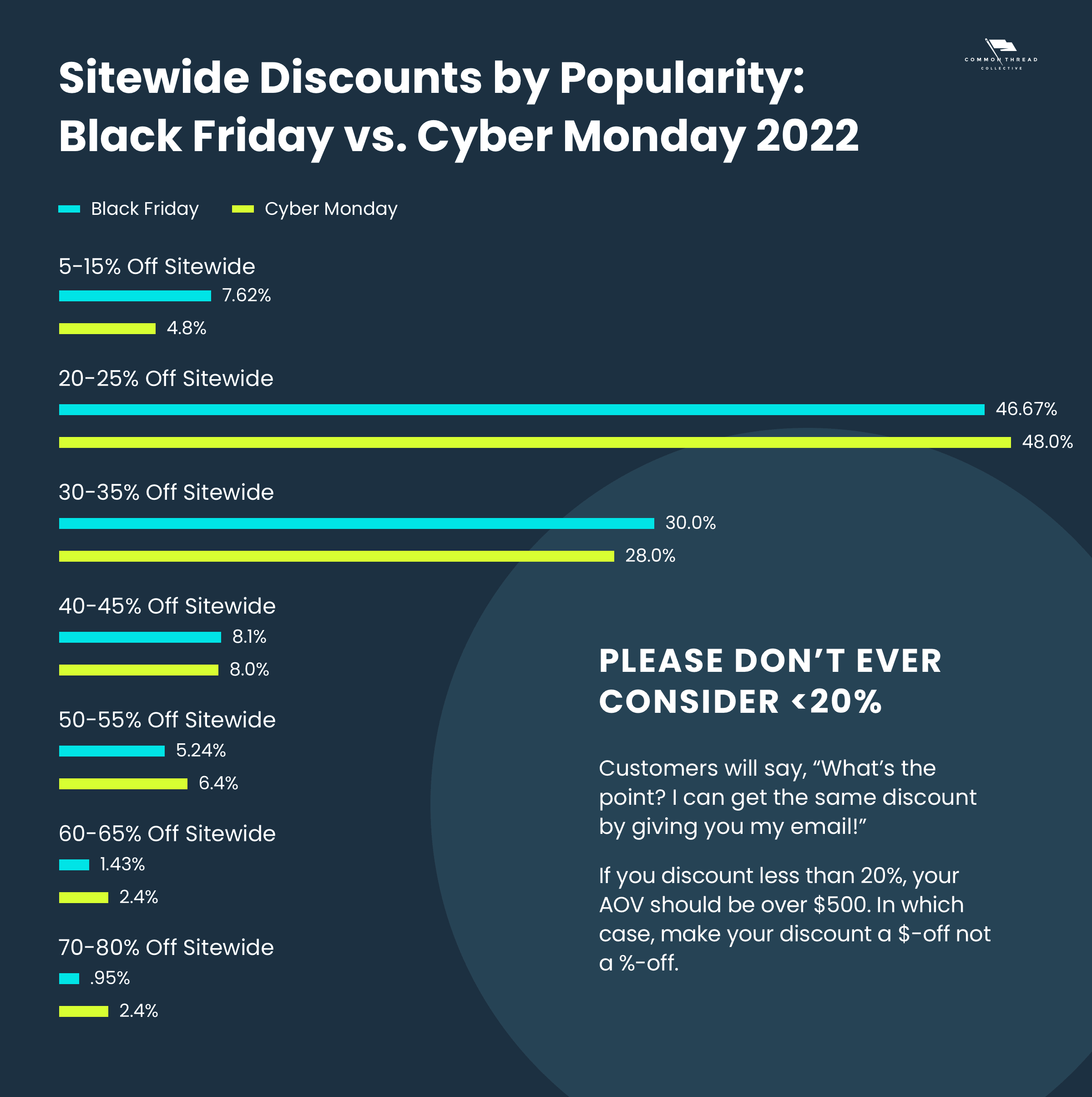
The real question is: how do you use that data to shape your 2023 holiday campaigns?
10 insights, backed by an army of examples, point the way. Make your holiday campaign …
Keep it simple, stupid (scrooge).
Your sale should be clear and concise enough to appear boldly on your homepage — not in a tiny banner above your nav bar that disappears after a scroll.
Whatever you’re offering for Black Friday Cyber Monday, never make your visitor read it twice to understand.
Make sure that the discount is automatically applied to their shopping cart at checkout, to eliminate unnecessary steps. Anytime you introduce a code, you add friction, and the result is lower conversion rates.
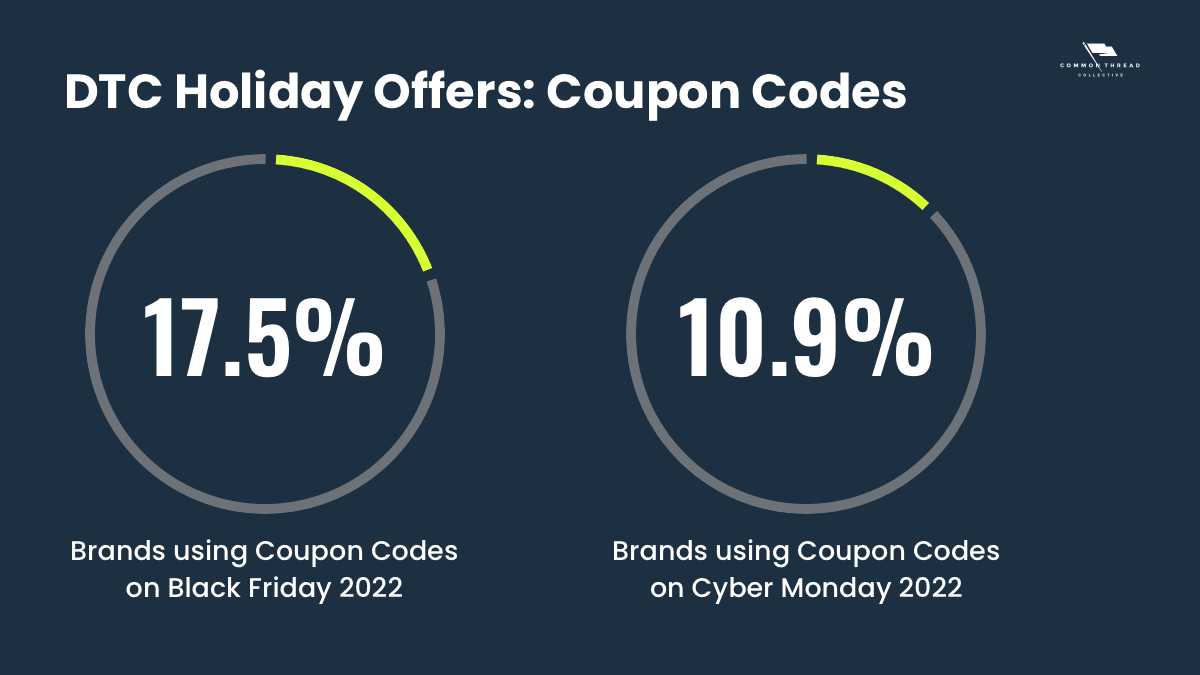
(The only exceptions are genuinely exclusive codes for loyalty members, early access, and deep discounts or giveaways.)
If you decide to have a coupon code, stay away from words that are hard to spell or have two of the same letters in a row like “holidaze” or “gatherround.”
Regardless of how premium your positioning, discounting on Black Friday Cyber Monday rarely cheapens a brand.
If you look at our list, higher-end DTCs like Outdoor Voices, Brooklinen, Summersalt, and Aurate decked their halls with cyber promos.

Just be sure your sale is really a sale. That means a minimum of 20% off.
Otherwise, you risk potential customers saying, “What’s the point? I can get the same discount by giving you my email!”
If you discount less than 20%, your AOV should be over $500. In which case, make your discount $-off, not %-off.
So, how do you develop an offer that checks all the boxes and ensures you meet your bottom-line goals?
Needless to say, it’s Black Friday for a reason.
For most, the danger of discounting isn’t brand equity. It’s going into the red.
That’s where (1) testing profit projections and (2) driving AOV to offset acquisition costs come into play.
To address the first, we’ve created a Holiday Offer Calculator. In it, you’ll be led step-by-step through your AOV (average order value), cost of delivery, and discounts to set spend, ROAS, and CPA targets:


The goal? Maximize your offer in a way that makes sense for your consumer, your unit economics, and your overall goals.
Once you enter your numbers, you can then play around — sticking to the 20-30% off range if possible — until you find an offer you like.
To optimize the second ingredient of profitability — increasing AOV — consider the next two insights …
Your ideal Q4 offer structure comes from a deep understanding of your business …
For a customized offer strategy, get in touch with us today.
If you run an ecommerce brand between $10-$100M, and your Growth Quotient score is 130 or higher, we’re so confident we can win the holiday season for you that we’ll cover your first month free.
If your unit economics don’t back out to at least 20-30% off, use a “Spend X, Save Y” or “Buy X, Get Y” model.
The former is best applied through a tier-discount, which we’ll cover next. The latter is a simpler version, though no less powerful.
There are a multitude of ways to shape this type of sale. Blenders Eyewear went with straightforward BOGO:
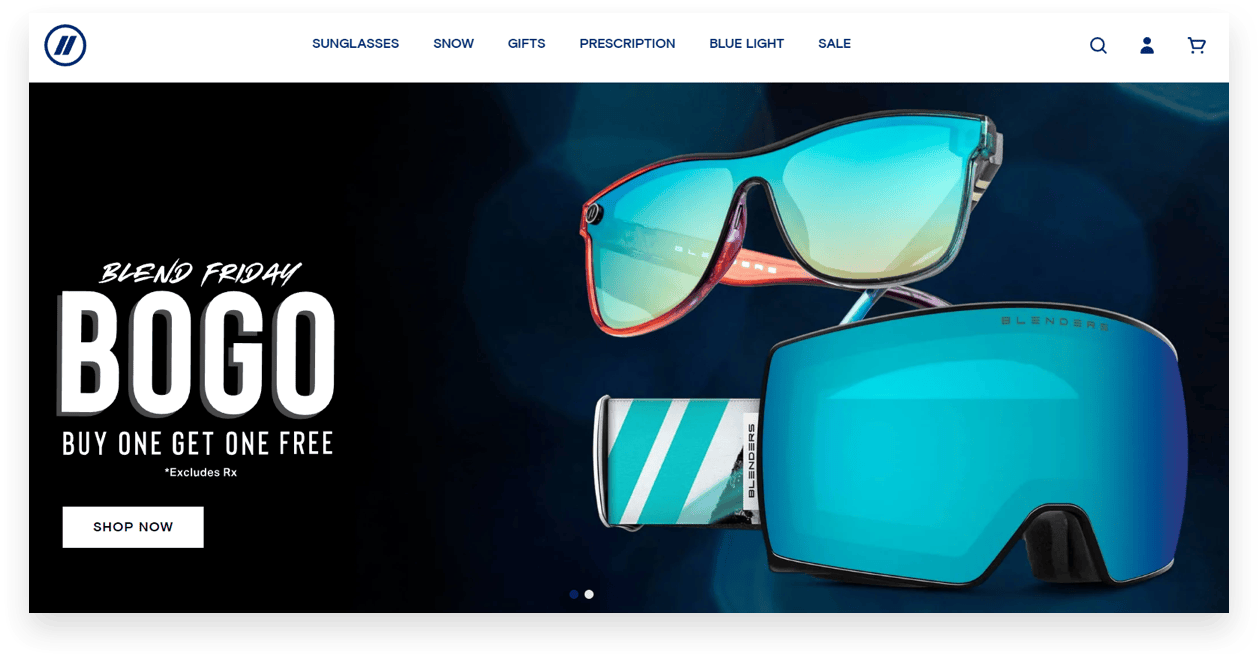
Shinesty went with a “Buy More, Get More Free Gifts” offer, while Breaking T showcased a Mystery Gift, and Duke Cannon offered a “Free Lump of Coal with Any Purchase” in 2022.
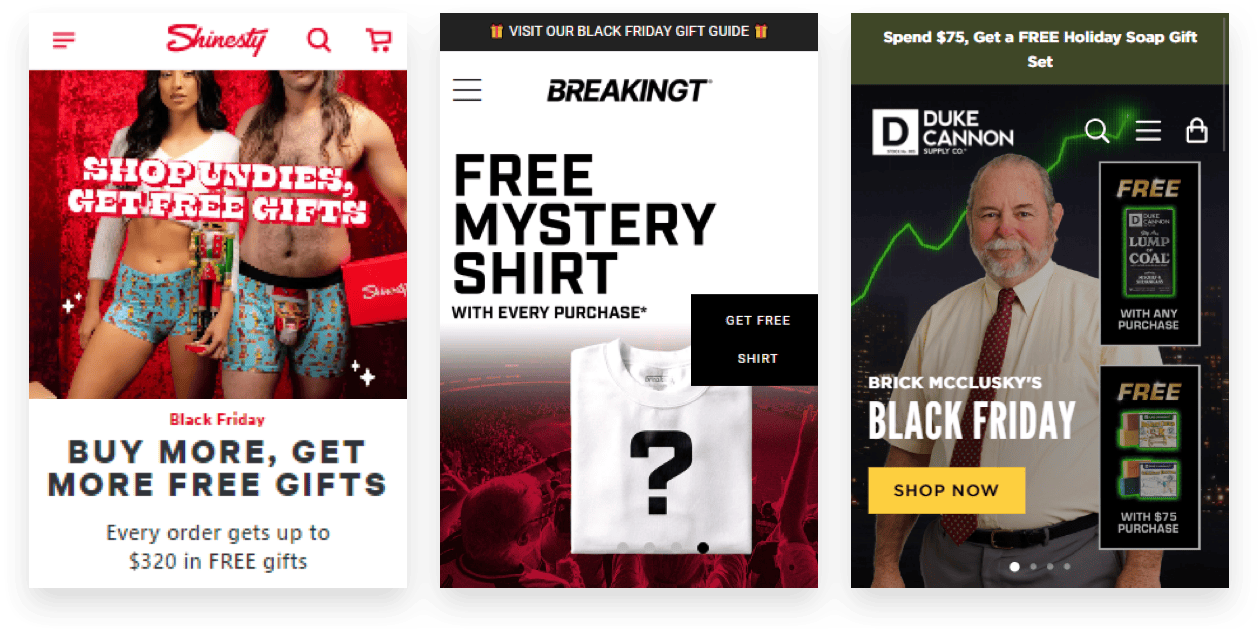
Even more economical are free gifts or ‘gift with purchase’ (GWP).
When shaping offers for Black Friday weekend, there are two ways to drive big revenue:
During the holiday season your customer file is a mix of people who will respond to higher AOV offers — bundles, threshold offers, gift with purchase, etc. And, those that won’t.
Use a mix of conditional, but exceptional offers to hit those high-AOV folks as well as sitewide percentage-off.
While shockingly under-utilized, bundling products or structuring your deal through tiered discounts can be massive.
A mere 4.0% of all Black Friday, Cyber Monday campaigns tied their sitewide discount to a tier.
To do that, take inspiration from sites like Parade, Bala, True Botanicals, and The RealReal.

With a higher price point, Burrow rightly focuses on dollar-off tiers rather than strictly percent:
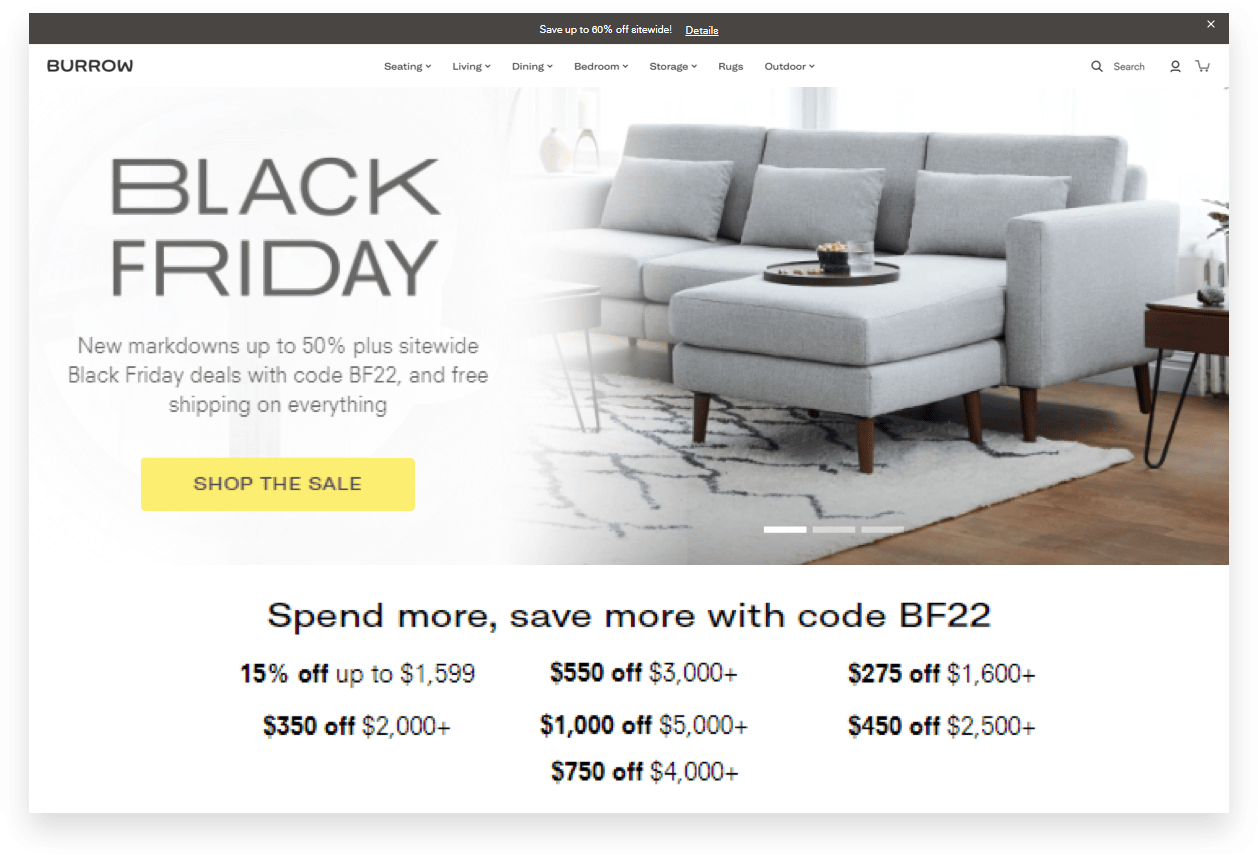
Vertical-wise, Apparel & Accessories brands far surpassed other categories with the most tiered offers. Proving that a wide range of price points can utilize this offer type — from casual jewelry to high-end designer fashion.
True holiday hype is an elusive thing.
Up against an increasingly crowded market, what really matters isn’t so much going big but rather making the deal, marketing, and onsite merchandising joyful in themselves.
Along these lines, three examples …
First, Alps & Meters.
This apparel brand kicked off Black Friday with sleek new arrivals for the winter season. Of note, the retailer did not offer any specific Black Friday promotions. It led with a stylish campaign focused on high-quality products for colder weather.

Second, Bloomscape.
Bloomscape took full advantage of the festive season with creative tailored to family gatherings and joyful meals around the table.

And third, Bombas.
Already at the top of many gifters list for cozy socks, slippers, and basics, Bombas centered messaging around “giving.” Famous for its mission to provide socks to those in need, the brand leaned further into its values for the holiday season.

At first glance, you’d be tempted to think DTC royalty Dollar Shave Club should be placed in the “None” category.
After all, its homepage over Black Friday (left) and Cyber Monday (right) didn’t contain a single nod to a sale nor discount.
You’d be wrong.
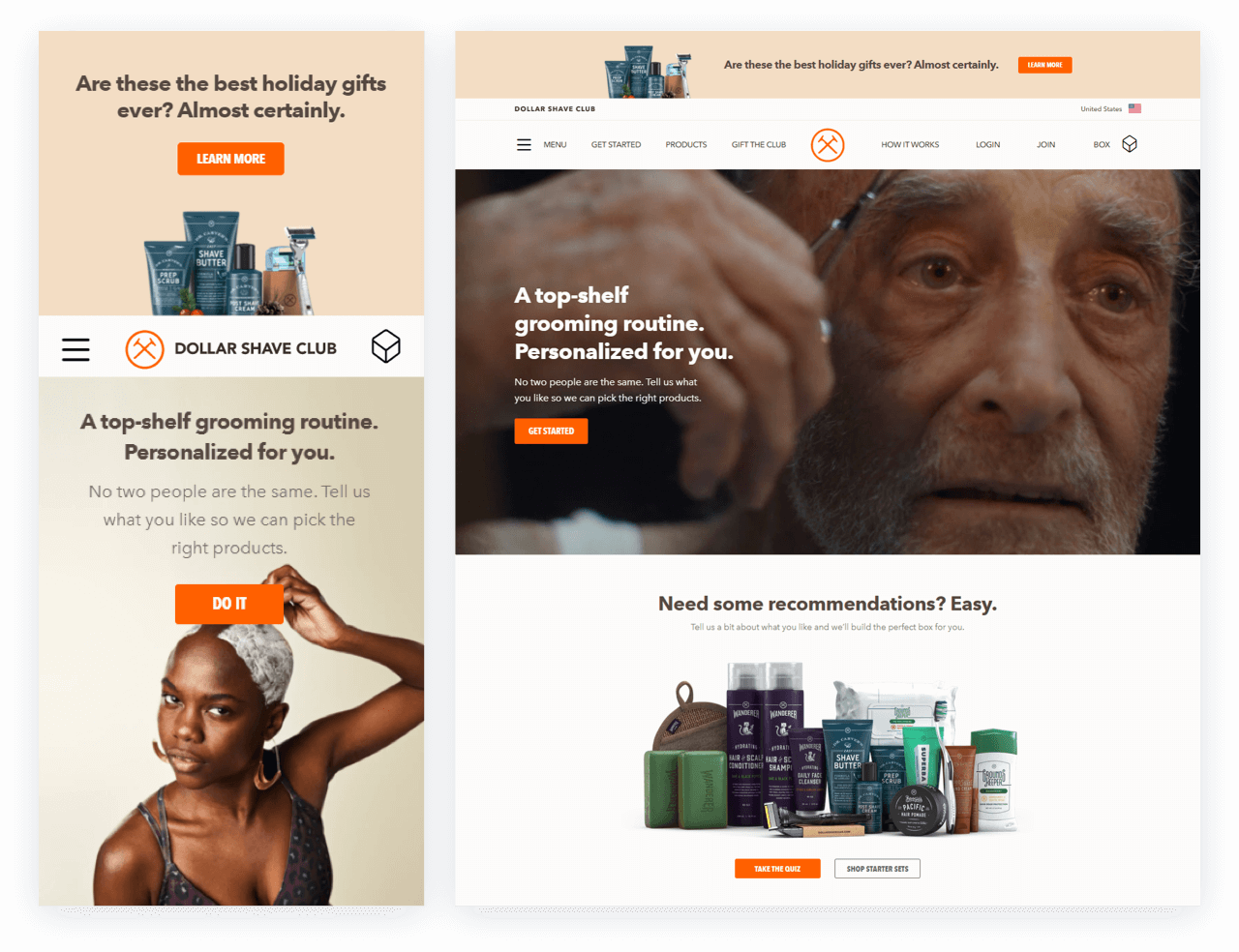
Rather than unleash its Black Friday offers upfront, Dollar Shave Club sent a torrent of SKU-based deals to email subscribers only:
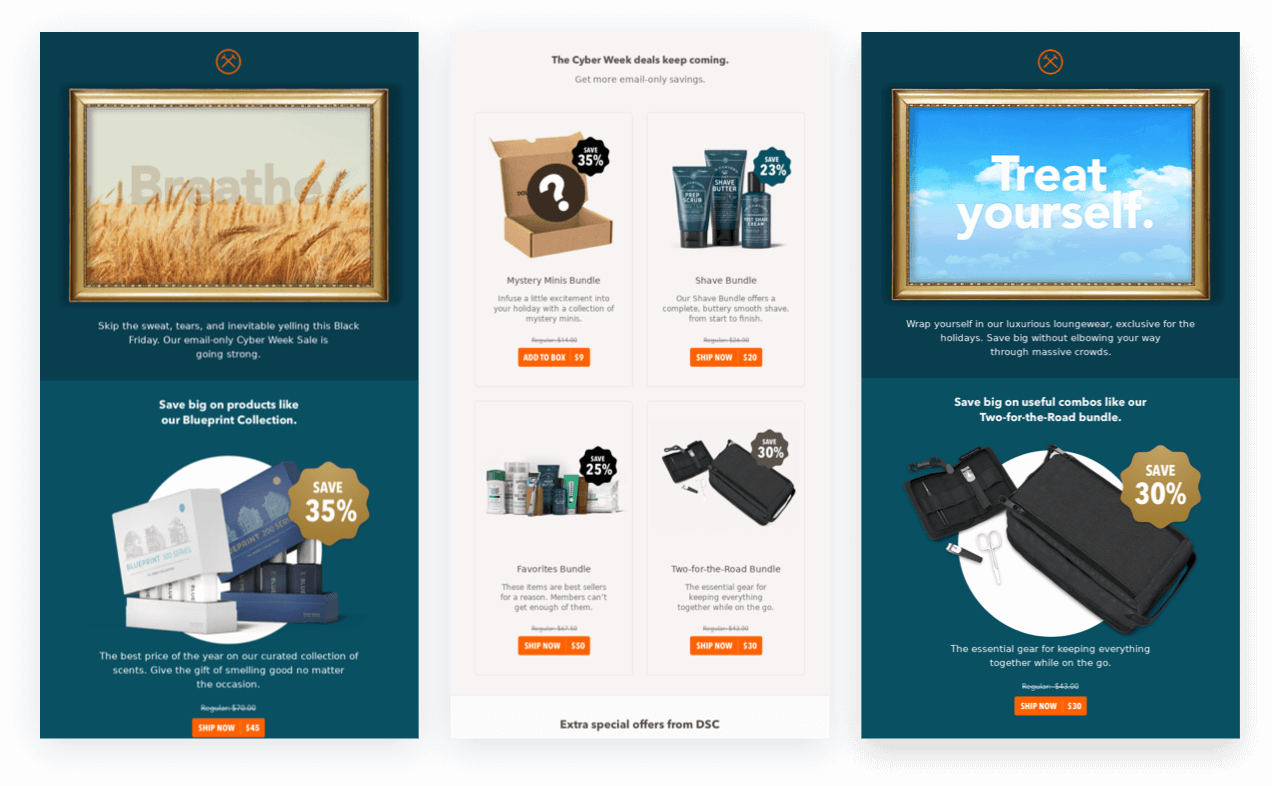
What’s more, the brand also drove traffic — organic as well as paid — to build up its email list rather than release the deals at large.

With 48% of BFCM sales coming from customers who engage prior to the holiday — and, ~75% of CTC client’s revenue generated from remarketing — the value of existing audiences and loyal customers cannot be overstated.
To achieve balance, don’t pit multiple offers to multiple audiences against each other.
Steve Madden, for instance, placed a bonus discount front-and-center onsite: 40%-off for its loyalty members versus 30%-off for non-members.
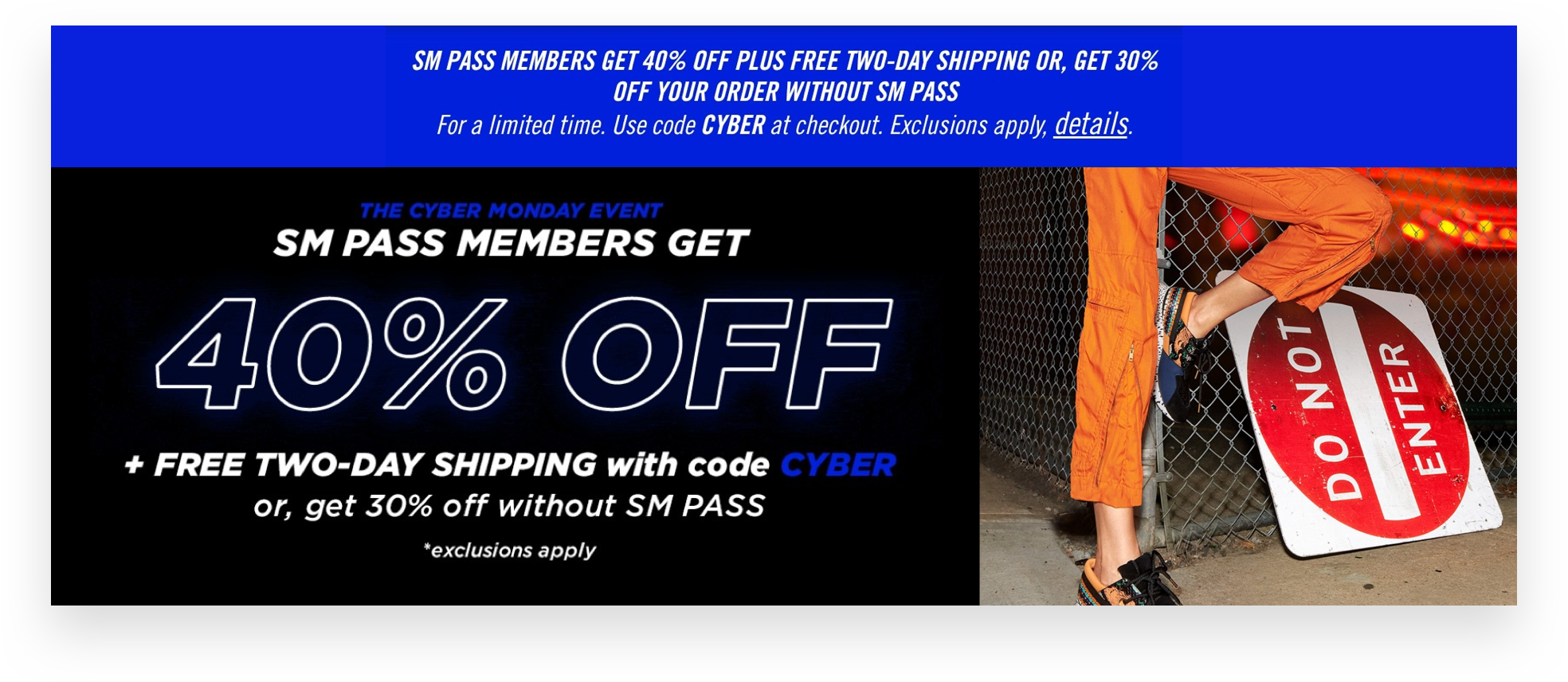
This kind of offer — much like Dollar Shave Club, though more accessible — incentivizes new holiday shoppers to connect more deeply and simultaneously rewards existing customers with ease of access.
Fabletics played on their membership exclusives, too. Featuring a Cyber Week promotion offering 80% off everything for VIP members only.

The most successful holiday marketing campaigns beyond DTC root themselves in emotional soil.
Past standouts include REI’s #OptOutside, Starbucks Red Cups, Google’s Santa Tracker, and Apple’s “Misunderstood” (to name just a few).


But how do you infuse gravity — elevated storytelling — into your ecommerce offer?
In recent years (as we learned in the Food and Beverage Industry Report) consumers value mission-oriented and enlightened brand values.
As a model, take High Snobiety’s messaging against Black Friday consumerism. The brand knows its customers well enough to not pander.
The blunt copy speaks to customer concerns and values … of course, there’s still a gift guide for those who want to participate in the holiday tradition.

Tecovas used Cyber Monday to support a cause its customers care about with donations. The “giving” theme allows brands to message on both gift giving and do-gooding.

Lastly, the most fun-filled deal type was gamification.
Shinesty, Chubbies, Anker, and Fenty x Savage took full advantage of this approach.
They rapidly released new pop-ups, notifications, and functionality for free-gifts and a countdown timer to keep the excitement high:

Anker, in contrast, built a digital “Prize Carnival” that dealt out discounts and prizes in exchange for email subscriptions:
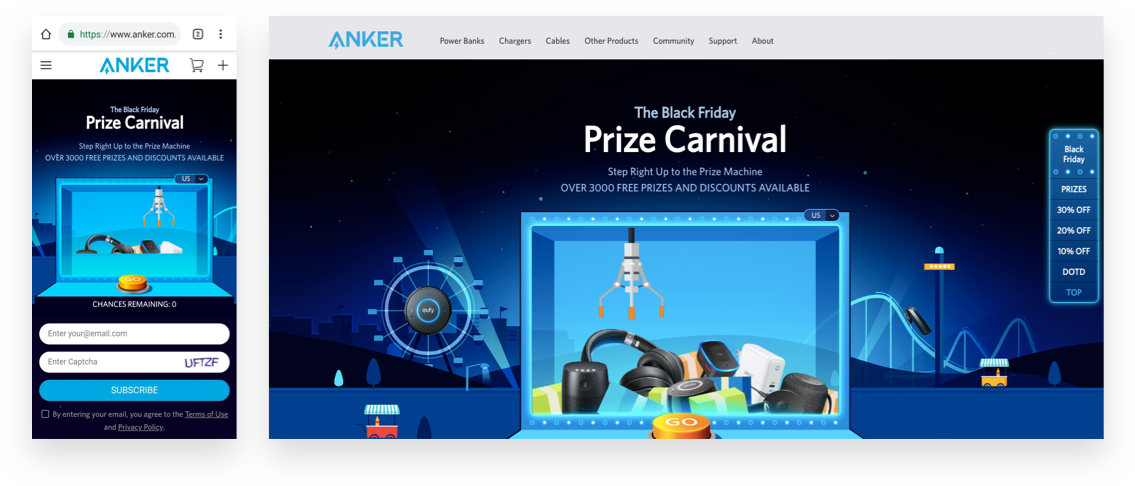
And Savage x Fenty left no holiday stop unpulled for the big day …
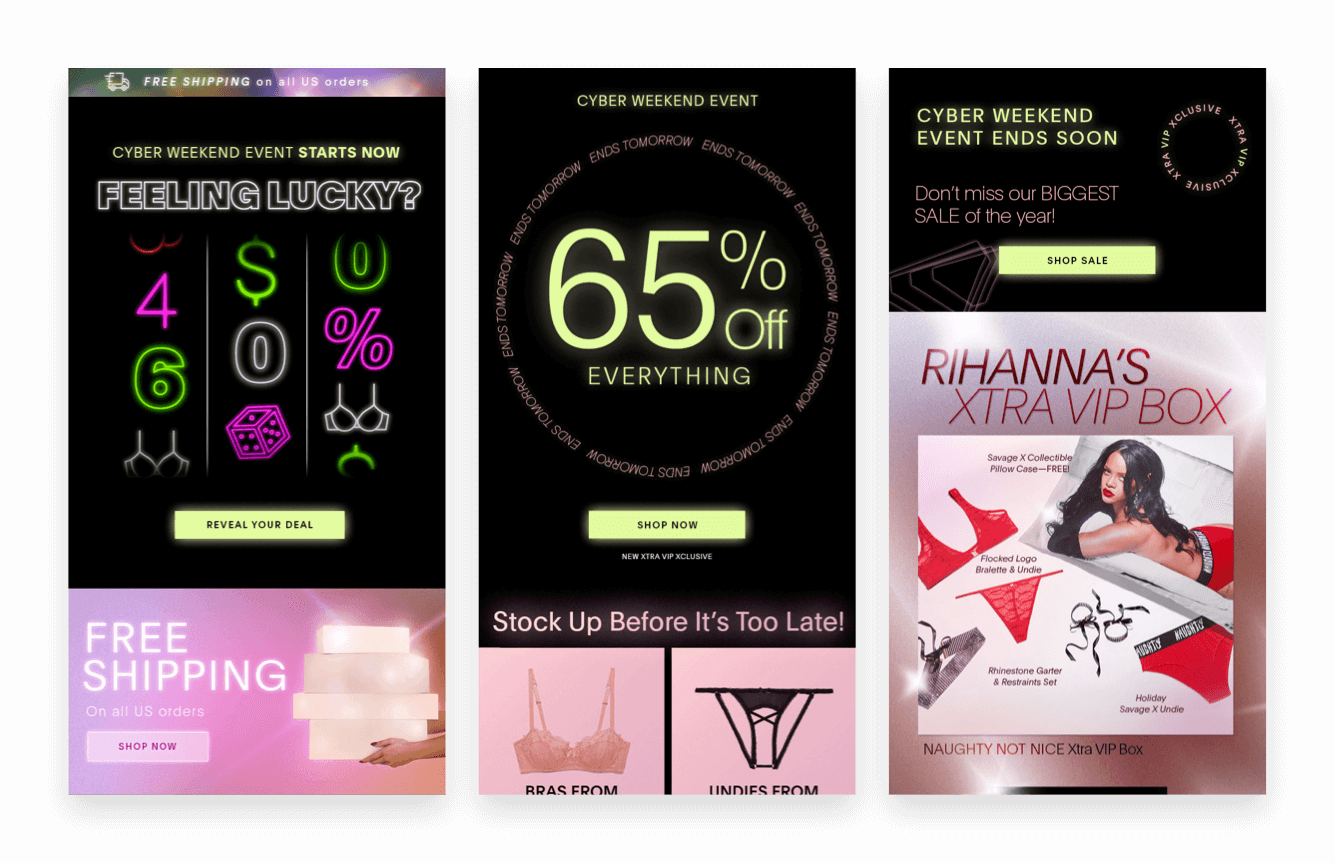
Get this level of strategic thinking for your own brand …
With BFCM around the corner, there’s never been a better time to sign up for CTC Services.
Plus, if you run an ecommerce brand between $10-$100M, and your Growth Quotient score is 130 or higher, we’re so confident we can win the holiday season for you that we’ll cover your first month free.
Gathering all these data points, insights, and examples from the previous year, plan a 2023 strategy to entice new customers as well as old.
First, start your email marketing campaigns early and often. Test subject lines, CTAs, cross-sells, and upsells — see what resonates with customers in anticipation of the big day. Second, make use of retargeting on social media, highlighting new products or upcoming online sales. Third, place a sense of urgency to ramp up Black Friday sales (plus a one-two-punch with Cyber Monday sales).
Keep discounts clear to prevent cart abandonment. Message consistently across landing pages, search engine placements, social media ads, and product pages. Remember, SEO plays a huge role in helping small businesses attract more customers during the busiest online shopping season of the year.
Bonus tip: If you’re feeling overwhelmed by Black Friday planning — or if you just want to level up your campaigns this year — CTC is here to make your wildest BFCM digital marketing dreams come true.
We have some of the best ecommerce marketing experts in the world on our team and, with hundreds of clients undergoing holiday prep at once, we’re able to offer unique insights into what’s working and what’s not.
Reach out for an audit to see how we can take your ecommerce campaigns to the next level this holiday season.
All that’s left now is to …
Happy holidays!

Find inspiration for Holiday 2023 with this sortable catalog of offers from the biggest DTC brands on the planet.
When you purchase the BFCM offers database, you’ll get:
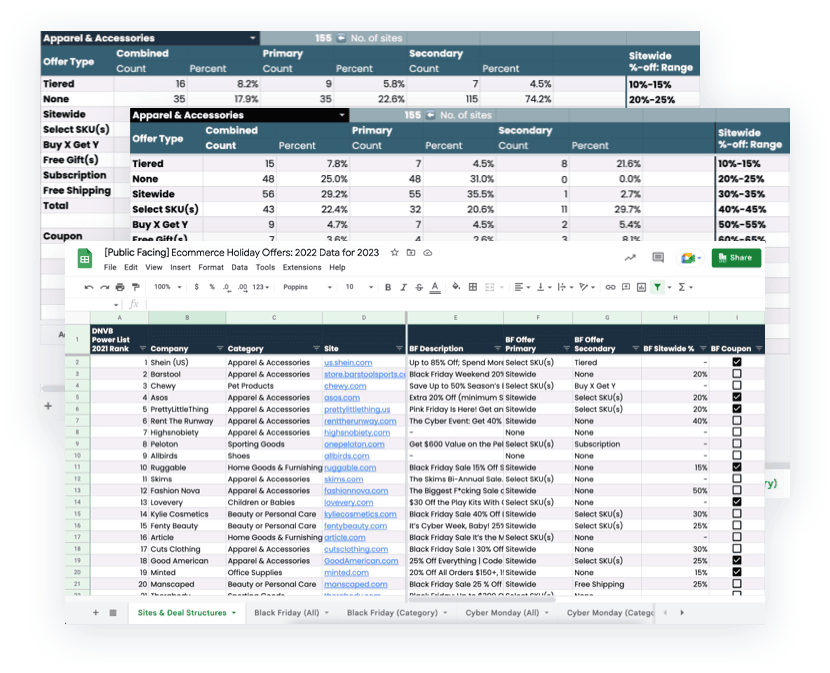
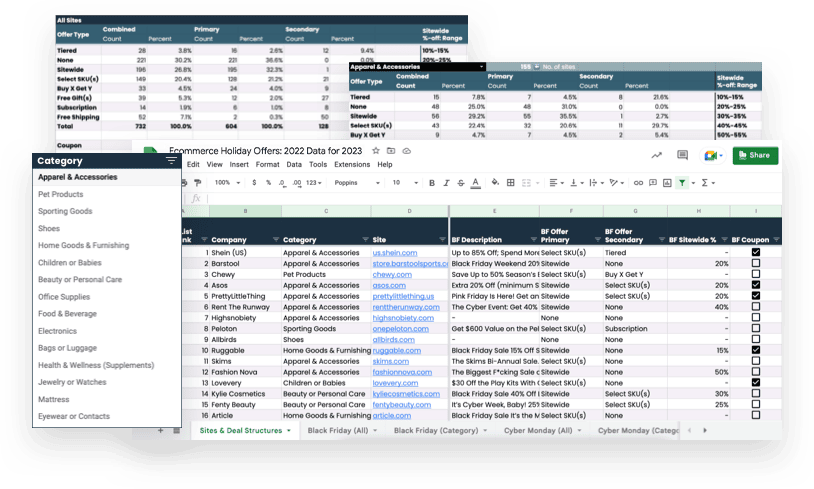
Purchase the BFCM Offers Database and you'll get:
Common Thread Collective is the leading source of strategy and insight serving DTC ecommerce businesses. From agency services to educational resources for eccomerce leaders and marketers, CTC is committed to helping you do your job better.
For more content like this, sign up for our newsletter, listen to our podcast, or follow us on YouTube or Twitter.